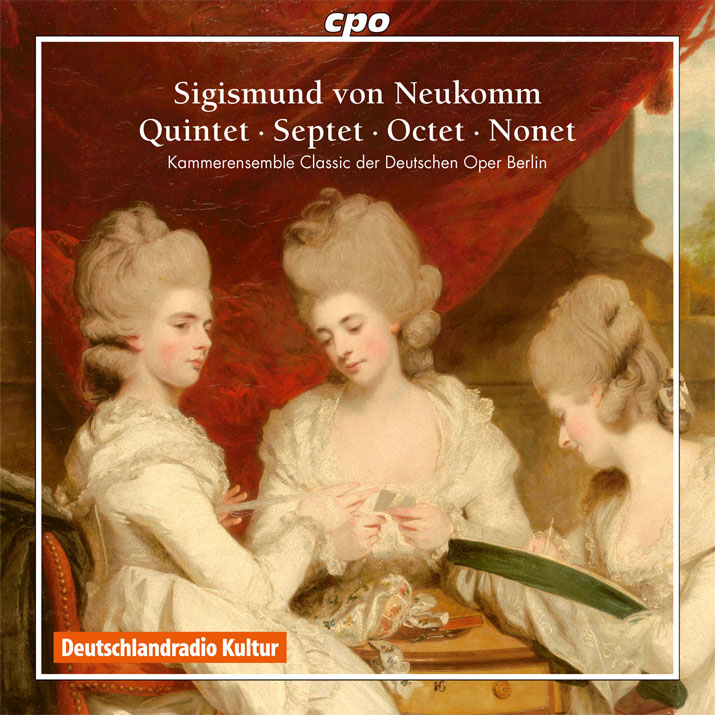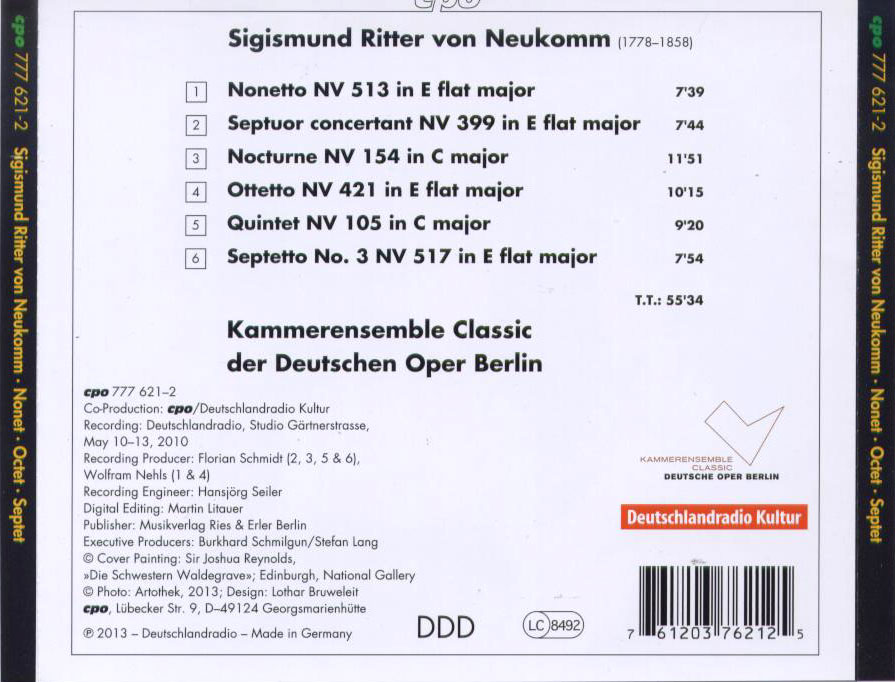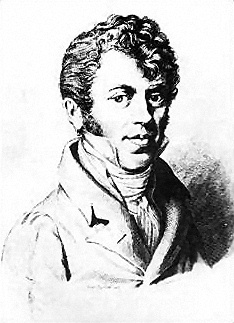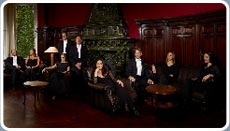Share This
Album at a Glance
Tags
Related Posts
- Paul Graener: Orchestral Works, Vol. 2 / Werner Andreas Albert
- Kuhlau (1786-1832): Flute Quintets / Ginevra Petrucci, flute; Kodaly Quartet
- Dmitri Kabalevsky: Cello Concertos 1 & 2; Colas Breugnon Suite / Torleif Thedéen, cello
- German Wind Quintets; Eisler, Hindemeth, Klughardt, Stockhausen / Aquilon Quintet
Sigismund von Neukomm: Quintet; Septet; Octet; Nonet
Posted by Paul Ballyk on Apr 9, 2013 in Classical | 0 comments
Sigismund von Neukomm has appeared previously in the virtual pages of Expedition Audio for a cpo CD of his orchestral music. This second Neukomm disc, also from cpo, offers an assorted collection of the composer's chamber music with winds, performed by the Kammerensemble Classic der Deutschen Opera Berlin.
Sigismond Neukomm (1778-1858) became Sigismund Ritter von Neukomm after being ennobled as a knight. A student and friend of both Franz Joseph and Michael Haydn, he kept company with the greatest composers of his day, was a celebrated composer himself and a renowned statesman for music. He travelled extensively throughout Europe, Russia and South America promoting Viennese classical music.
A highly prolific composer, Neukomm wrote chamber music in a wide variety of forms, usually for rather atypical instrumental groupings. Those of the classic string quartet and piano trio for example are absent from his catalog all together. On this CD alone we have six works, all but one scored differently from the rest including a Nocturne for Oboe, Horn and Piano - a Quintet for Flute, Horn, Violin, Viola and Harp - and a Septet for Flute, Oboe, Clarinet, Bassoon, Horn, Trumpet and Double Bass. Each piece is relatively brief and all are in one movement only. von Neukomm is evidently experimenting with instrumental combinations, creating unique sounds that might later be heard in other chamber works or in his orchestral pieces. The music is all very fun to listen to. If you enjoy the wind music of Hummel, Reicha, Danzi or Krommer, you'll enjoy this too.
The performances are excellent. These guys can play, and play together, as they do during their day jobs as members of the Deutsche Oper Berlin. Performances are stylistically homogeneous, perfectly balanced and in tune, and recorded in a big rich sound with the instruments well forward creating sonics ideal for the intimacy of a chamber music recording.
Neukomm’s Delight in Experimentation
During the first half of the nineteenth century Sigismund Neukomm numbered among Europe’s most highly esteemed composers. His rightful claim to this status is very convincingly demonstrated not only by his four original orchestral fantasies (cpo 777 573-2) but also by his chamber music. Neukomm loved experimentation. In symphonic music he invented the genre of the »Fantaisie à grand orchestre,« and in chamber music he tested unusual ensembles and programmatic content as well as individual movement sequences and formal processes. Neukomm was often concerned less with the dramaturgy of contrasting themes than with the development of the tonal charm of instruments so very different in character. Here too, however, Neukomm did not do without original formal ideas, and he was very much aware of the exoticism sometimes manifesting itself in his instrumental combinations. His chamber music for large ensembles of strings and winds can be regarded as a self-contained work group; it comprises one nonet, one octet, and three septets composed during the years from 1832 to 1836. Neukomm composed all these works while residing or traveling in England. Of Neukomm’s three septets, the second cannot be located at the present time. A special feature of instrumentation distinguishes Neukomm’s works of this kind from older nonets, octets, and septets such as those by Beethoven, Schubert, Hummel, or Spohr: the winds are more dominant than the strings. In Neukomm’s works the wind instruments typical of this epoch (flute, oboe, clarinet, bassoon, horn, trumpet) are prescribed in a simple instrumentation, and he even calls for the trumpet, an instrument still rarely featured in solo roles during his time. The string lineup varies: the septets call for double bass; the octet, for violoncello and double bass; and the nonet for viola, violoncello, and double bass.
Source: cpo records
|
Composer: Sigismund von Neukomm Neukomm first studied with the organist Weissauer and later studied theory under Michael Haydn, though his studies at Salzburg University were in philosophy and mathematics. He became honorary organist at the Salzburg University church in 1792, and was…
en.wikipedia.org/wiki/Sigismund_von_Neukomm
|
|
|
Performers: Kammerensemble Classic der Deutschen Oper Berlin (Chamber Ensemble of the Berlin Classic German Opera) The Kammerensemble Classic of the Deutschen Oper Berlin was founded in 1992 by musicians from the Deutschen Oper Berlin to perform music that had disappeared from the regular repertoire, of the early classic, classical and romantic periods for various instrumental combinations. The founding members played violin, flute, viola, bassoon, cello and piano. |
| Thinking about purchasing this album?
Follow this link for more album details or to make the purchase. Buy it now |
“Not just recommended. Guaranteed.”
We stand behind every album featured on Expedition Audio. Our objective is to take the monetary risk out of music exploration. If you order this album from HBDirect.com and do not like it you can return it for a refund.









